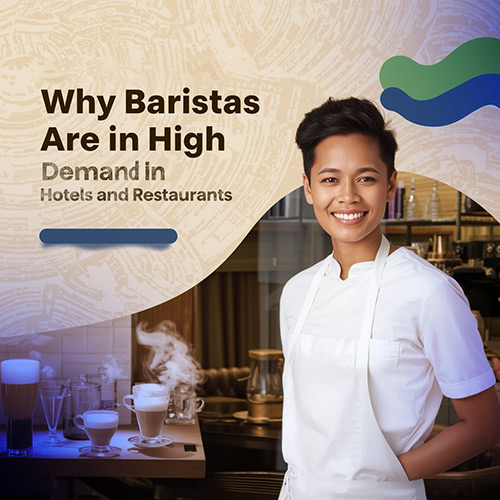Why Baristas Are in High Demand in Hotels and Restaurants?
Introduction – The Rising Coffee Culture
Baristas play a vital role in today’s coffee culture. In recent years, coffee has become much more than just a morning beverage. Across the world, people have started to embrace coffee culture as part of their lifestyle. Whether it’s enjoying a cappuccino in the morning, sipping an iced latte in the afternoon, or having an espresso shot after dinner, coffee has secured a permanent place in the daily routine of millions.
This growing demand for coffee has changed the hospitality industry dramatically. Hotels and restaurants, which once focused only on food and lodging, are now also competing to provide the best coffee experience. And at the heart of this trend lies the barista – the skilled professional who can transform a simple cup of coffee into an unforgettable experience.
The Role of a Barista in Hospitality
A barista is more than just someone who serves coffee. In the hospitality industry, they are brand ambassadors who represent the quality and culture of a hotel or restaurant.
Crafting Beverages with Precision:
From brewing espresso to creating latte art, baristas ensure that every cup of coffee meets high standards. Guests expect consistency, and baristas deliver it with skill and technique.
Enhancing Guest Experience:
In hotels, guests often begin their day with a cup of coffee. A barista’s smile, service, and perfect brew can set the tone for the entire stay. Similarly, in restaurants, a freshly made coffee after a meal adds to the overall dining experience.
Baristas don’t just serve drinks – they create moments of delight that guests remember.
Why Hotels and Restaurants Hire Skilled Baristas
The demand for baristas in hotels and restaurants has increased sharply in the last decade. But why is this trend so strong?
Growing Demand for Premium Coffee:
Guests are no longer satisfied with basic filter coffee. They want café-quality cappuccinos, espressos, and specialty drinks. Hiring a trained barista ensures that hotels and restaurants can meet this demand.
Competitive Advantage:
In a highly competitive hospitality market, small details matter. A hotel or restaurant that offers an excellent coffee experience stands out and attracts more customers.
Café-Style Dining Trend:
Many hotels now have lobby cafés or coffee bars. Restaurants also add coffee menus to enhance the dining experience. Without baristas, this trend would not be possible.
Customer Retention and Loyalty:
Guests who enjoy their coffee experience are more likely to return or recommend the hotel/restaurant to others. Baristas directly influence customer satisfaction and loyalty.
Skills That Make Baristas Valuable
Hotels and restaurants do not hire baristas just for making coffee – they hire them for their specialized skills. Some of the key skills that make baristas highly valuable in the hospitality industry include:
Espresso Mastery:
Knowing the right grind size, tamping pressure, and extraction time to create a perfect espresso shot.
Latte Art & Creativity:
Guests are often impressed by the creativity of latte art, which enhances the overall presentation.
Knowledge of Brewing Methods:
Beyond espresso machines, skilled baristas understand pour-over, AeroPress, French press, and cold brew techniques.
Speed & Efficiency:
Hotels and restaurants often deal with large numbers of guests. A barista must serve quickly without compromising quality.
Customer Engagement:
A good barista communicates warmly with guests, explains coffee options, and builds a personal connection.
These skills combine both technical expertise and customer service, making baristas essential for the success of modern hospitality businesses.
Career Opportunities for Baristas
One of the reasons baristas are in such high demand is the wide range of career opportunities available for them, especially in hotels and restaurants.
Hotel Coffee Bars & Lounges:
International hotels have dedicated barista counters where guests expect premium coffee. This creates direct job opportunities for skilled baristas.
Restaurant Coffee Service:
Many fine-dining restaurants now add a specialty coffee menu to complement desserts, creating space for baristas to showcase their craft.
International Career Growth:
The hospitality industry is global, and barista skills are highly transferable. A skilled barista in Bangladesh, for example, can easily find opportunities in the Middle East, Europe, or Asia.
Path to Management or Entrepreneurship:
With experience, baristas can grow into café managers, beverage trainers, or even start their own coffee shops.
For young professionals, this career path is attractive not only because of its creative nature but also due to the global job market that values trained baristas.
The Future of Baristas in Hospitality
The demand for baristas will continue to rise as global coffee consumption grows. According to market research, the specialty coffee industry is expanding rapidly, and hotels and restaurants are adapting to this trend.
With more people seeking personalized and premium experiences, baristas will play an even bigger role in shaping the future of hospitality. From introducing sustainable coffee practices to experimenting with new brewing styles, the role of a barista is evolving every year.
Conclusion
Baristas are no longer limited to cafés – they are an essential part of the hotel and restaurant industry. Their ability to deliver high-quality coffee, enhance guest experiences, and contribute to brand identity makes them one of the most in-demand professionals in hospitality.
Hotels and restaurants that invest in skilled baristas gain a competitive advantage, retain more customers, and create memorable experiences for their guests. As coffee culture continues to grow worldwide, the demand for trained baristas will only get stronger.
So, if you are considering a career in hospitality or looking to upgrade your hotel or restaurant service, remember: a skilled barista can make all the difference.

